Top Rankings
Sevier School District ranks among the top 20% of public school district in Utah for:
Category
Attribute
Community Size
Largest student body (number of students) (Top 1%)
For the 2025 school year, there is 1 public preschool serving 164 students in Sevier School District.
Public Preschools in Sevier School District have a diversity score of 0.24, which is less than the Utah public preschool average of 0.48.
Minority enrollment is 13% of the student body (majority Hispanic), which is less than the Utah public preschool average of 31% (majority Hispanic).
Overview
This School District
This State (UT)
# Schools
14 Schools
408 Schools
# Students
4,744 Students
195,137 Students
# Teachers
233 Teachers
9,057 Teachers
Student : Teacher Ratio
20:1
20:1
District Rank
Sevier School District, which is ranked within the top 30% of all 153 school districts in Utah (based off of combined math and reading proficiency testing data) for the 2020-2021 school year.
The school district's graduation rate of 83% has increased from 77% over five school years.
Overall District Rank
#45 out of 154 school districts
(Top 30%)
(Top 30%)
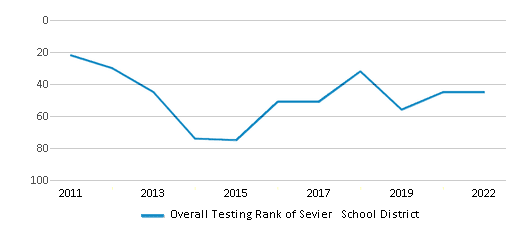
Math Test Scores (% Proficient)
(20-21)46%
39%
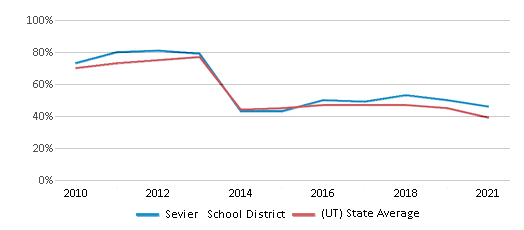
Reading/Language Arts Test Scores (% Proficient)
(20-21)44%
43%
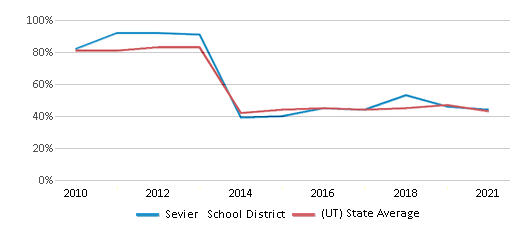
Science Test Scores (% Proficient)
(20-21)44%
45%
Graduation Rate
83%
88%
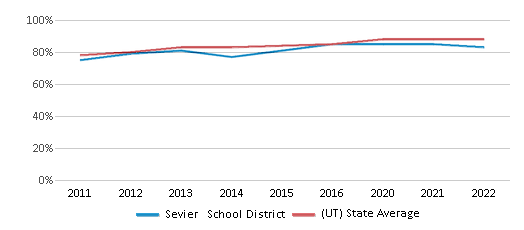
Students by Ethnicity:
Diversity Score
0.21
0.48
# American Indian Students
164 Students
2,004 Students
% American Indian Students
3%
1%
# Asian Students
20 Students
2,792 Students
% Asian Students
n/a
2%
# Hispanic Students
271 Students
41,494 Students
% Hispanic Students
6%
21%
# Black Students
36 Students
2,695 Students
% Black Students
1%
1%
# White Students
4,212 Students
134,941 Students
% White Students
89%
69%
# Hawaiian Students
41 Students
3,551 Students
% Hawaiian Students
1%
2%
# Two or more races Students
n/a
7,647 Students
% of Two or more races Students
n/a
4%
Students by Grade:
# Students in PK Grade:
164
16,151
# Students in K Grade:
314
23,940
# Students in 1st Grade:
330
24,978
# Students in 2nd Grade:
339
26,403
# Students in 3rd Grade:
375
26,290
# Students in 4th Grade:
335
26,559
# Students in 5th Grade:
340
27,209
# Students in 6th Grade:
321
18,075
# Students in 7th Grade:
330
1,029
# Students in 8th Grade:
352
1,462
# Students in 9th Grade:
434
1,079
# Students in 10th Grade:
354
570
# Students in 11th Grade:
414
560
# Students in 12th Grade:
342
832
# Ungraded Students:
-
-
District Revenue and Spending
The revenue/student of $11,585 is higher than the state median of $10,732. The school district revenue/student has stayed relatively flat over four school years.
The school district's spending/student of $12,153 is higher than the state median of $10,829. The school district spending/student has stayed relatively flat over four school years.
Total Revenue
$55 MM
$7,309 MM

Spending
$58 MM
$7,375 MM
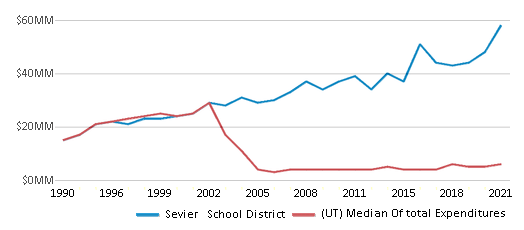
Revenue / Student
$11,585
$10,732
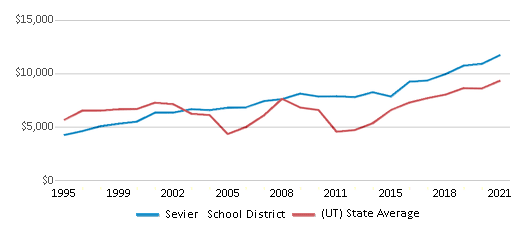
Spending / Student
$12,153
$10,829
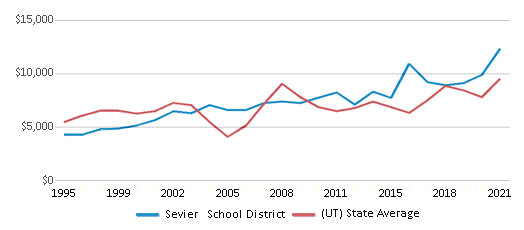
Best Sevier School District Public Preschools (2025)
School
(Math and Reading Proficiency)
(Math and Reading Proficiency)
Location
Grades
Students
Rank: n/an/a
Richfield Preschool
Special Education School
80 W Center
Richfield, UT 84701
(435) 896-8776
Richfield, UT 84701
(435) 896-8776
Grades: PK
| 164 students
Recent Articles

Sexual Harassment at Age 6: The Tale of a First Grade Suspension
A six-year old in Aurora, Colorado, was suspended after singing an LMFAO song to a little girl in his class and reportedly “shaking his booty.” We look at the case and the sexual harassment problem in public schools today.

How Scaffolding Could Change the Way Your Child Learns
This article explores the concept of instructional scaffolding, a teaching method that enhances learning by breaking down complex tasks into manageable parts. It highlights how scaffolding supports students in developing critical thinking skills and becoming more independent learners. The article discusses the benefits of scaffolding, including improved engagement and reduced anxiety, and provides strategies for its implementation across various educational levels.

February 05, 2025
Understanding the U.S. Department of Education: Structure, Impact, and EvolutionWe explore how the Department of Education shapes American education, from its cabinet-level leadership to its impact on millions of students, written for general audiences seeking clarity on this vital institution.





